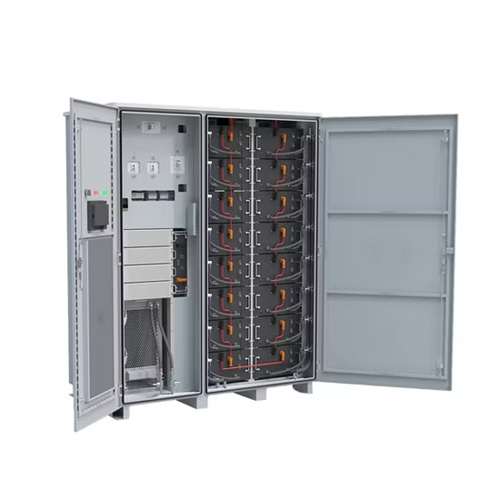The principle of photovoltaic panel silicon wafer flipping

Photovoltaic recycling: enhancing silicon wafer recovery process
silicon wafer recovery is indispensable for the solar panel industry, facilitating ecient resource usage, extending product lifespan, and improving overall performance. By continuously

Understanding Crystalline Silicon PV Technology
The basic principle behind crystalline silicon PV technology is the conversion of sunlight into electrical energy using semiconductor materials. In fact, recycling programs have been established to recover valuable materials

The Working Principle and Structure of Monocrystalline Silicon Solar Panel
Each solar panel contains a silicon wafer made of single crystal silicon. Single crystals are formed using the Czochralski method, in which a "seed" crystal is placed in a vat of

What is the Manufacturing Process of Solar Panels?
The manufacturing process of solar panels primarily involves silicon cell production, panel assembly, and quality assurance. Starting from silicon crystals, the process includes creating ingots and wafers, doping to

What Is The Manufacturing Principle Of Solar Cell
There are eight steps to produce solar cells from silicon wafers to the final testing of the ready solar cell. Step 1: Wafer check. Silicon wafer is the carrier of solar cell. The quality of silicon wafer directly determines the

Flow Chart of the Solar Panel Manufacturing Process:
Explore a detailed flow chart of the solar panel manufacturing process, from raw silicon to finished panels. Unveil the steps of photovoltaic production. Texturing starts the solar panel process. It makes the silicon

Status and perspectives of crystalline silicon photovoltaics in
With a typical wafer thickness of 170 µm, in 2020, the selling price of high-quality wafers on the spot market was in the range US$0.13–0.18 per wafer for multi-crystalline silicon

How are Solar Panels Made? | The Scientific Steps | Ossila
Forming Silicon Wafers The process of forming silicon wafers for solar panels. Furnace - Silicon is first extracted from harvested silicon dioxide SiO 2 by melting it in an electric arc furnace to

Typical process flow in the production of crystalline silicon wafers
In the photovoltaic industry monocrystalline silicon wafers are employed for the manufacture of solar panels with high conversion efficiency. The cutting process induces micro-cracks on the

Solar Panel Manufacturing: From Selenium to Silicon
Wafer Slicing: The ingots are then sliced into thin wafers, the building blocks of solar cells. Precision is key in this step to ensure uniformity in thickness, which affects the cell''s performance. Identifying Common

How Do Photovoltaic Cells Work?
The silicon wafers used to manufacture monocrystalline solar panels are cut from an ingot made from a single, lab-grown, silicon cell. Solar Panel Assembly. Once the above steps of PV cell manufacturing are complete,

Recent advances of silicon wafer cutting technology for photovoltaic
The process flow of silicon wafers for photovoltaic solar cells is shown in Figure 1 [2]. There are rigorous requirements for the quality of the cut silicon wafer, Its working principle is as

Revisiting thin silicon for photovoltaics: a
Thinning the silicon wafer well below the industry-standard 160 μm, in principle reduces both manufacturing cost and capex, and accelerates economically-sustainable expansion of PV manufacturing. In this analysis

A method to recycle silicon wafer from end-of-life photovoltaic
In 2020, a total PV capacity of 760.4 GW was installed worldwide [2], while at the end of 2021, despite the covid-19 pandemic, the global PV installed capacity reached at least

A critical review on the fracture of ultra-thin photovoltaics silicon
The main research method is to carry out 3 PB test on the whole PV silicon wafer (156 mm × 156 mm) in two directions of vertical to and parallel to saw marks, and the

6 FAQs about [The principle of photovoltaic panel silicon wafer flipping]
Will thin-film solar cells displace solar cells based on silicon wafers?
Since the inception of the solar industry in the 1960s, it has been predicted that thin-film solar cells will eventually displace solar cells based on silicon wafers.
What is a silicon PV cell?
A typical silicon PV cell is a thin wafer, usually square or rectangular wafers with dimensions 10cm × 10cm × 0.3mm, consisting of a very thin layer of phosphorous-doped (N-type) silicon on top of a thicker layer of boron-doped (p-type) silicon. You might find these chapters and articles relevant to this topic.
What changes have been made to silicon PV components?
In this Review, we survey the key changes related to materials and industrial processing of silicon PV components. At the wafer level, a strong reduction in polysilicon cost and the general implementation of diamond wire sawing has reduced the cost of monocrystalline wafers.
Can wire sawing produce crystalline wafers for solar cells?
Wire sawing will remain the dominant method of producing crystalline wafers for solar cells, at least for the near future. Recent research efforts have kept their focus on reducing the wafer thickness and kerf, with both approaches aiming to produce the same amount of solar cells with less silicon material usage.
Will silicon wafer-based solar cells be eclipsed?
The forecasted eclipse of silicon wafer-based solar cells has not yet occurred, as presently about 90% or more of commercial solar cell products are still bulk silicon devices made from silicon cast ingots, pulled single-crystal boules, or ribbon/sheet.
What is the process flow of a crystalline silicon solar cell line?
Schematic process flow for an industrial crystalline silicon solar cell line. 1. The entrance interface is the wafer in a stack. As a first step the wafers are typically inspected for microcracks using infrared transmission.
Related Contents
- Principle of photovoltaic panel silicon wafer removal equipment
- Silicon panel photovoltaic principle
- Silicon wafer photovoltaic panel quality inspection indicators
- Photovoltaic panel power generation heating rod principle
- Principle of automatic photovoltaic panel arrangement machine
- Photovoltaic panel circuit principle
- What is the principle of photovoltaic panel lights
- Principle of photovoltaic panel voltage and current monitoring
- Is silicon wafer good for photovoltaic panels
- 275W monocrystalline silicon photovoltaic panel
- Single silicon photovoltaic panel